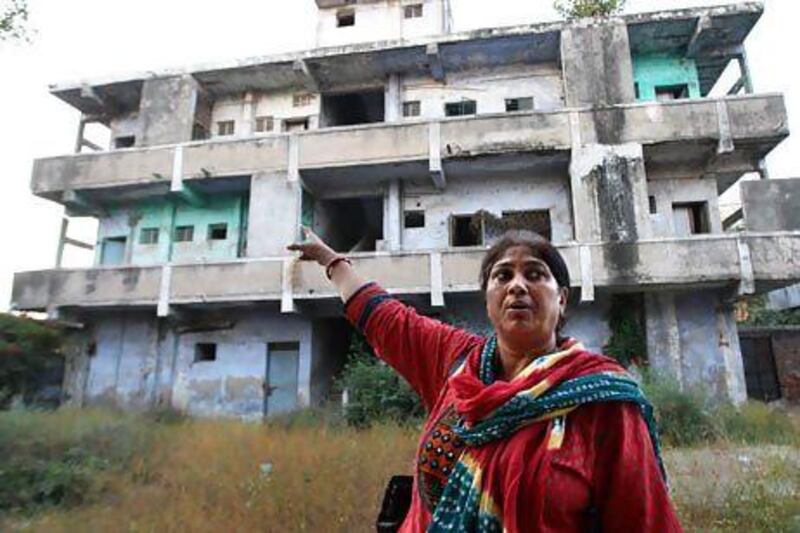AHMEDABAD // Rupa Dara Mody moved to get away from the violence. In 1996, she and her family left Shahpur - an area then known for frequent inter-religious confrontations - for an affluent, mostly Muslim neighbourhood called the Gulberg Society in the state of Gujarat. The violence eventually followed.
Mrs Mody's 13-year-old son Ajar and 68 other people were killed in a Hindu rampage against Muslims on February 28, 2002.
The night before a mob of Muslims had set a train on fire, killing almost 60 Hindu pilgrims returning from the holy city of Ayodhya.
The Hindus sought revenge, igniting rioting that would continue for four months and leave nearly 1,000 people dead.
Ten years later legal proceedings against some of those alleged to be responsible continue. More than 100 people, both Hindu and Muslim, have been convicted in four separate cases. But none of the convictions have been for the Gulberg Society deaths.
In April, investigators appointed by India's supreme court acquitted Gujarat's chief minister, Narendra Modi, 62, of any responsibility for the rioting, saying there was no evidence against him. He is now running for a fourth term in this month's election, which is being held on a variety of staggered dates. The final results will be released December 20.
The acquittal and memories of 2002 haunt Mrs Mody. "The pelting of stones started, then came burning tyres and bulbs filled with acid," she recalled earlier this week of that February night a decade ago.
"Modi says in the 10 years he has ruled there has been no riots, no curfews. He started one and on the back of it he has ruled with the fear in people's hearts,'' she added.
Mr Modi has refused to apologise for the riots, telling the Wall Street Journal in August, that "only has to ask forgiveness if one is guilty of a crime." The issue of violence in this race has been mostly overshadowed by economic issues.
Mrs Mody and her two children, Ajar and 11-year-old Benifer, had sought refuge in the house of a neighbour, Ehsan Jafri, a former member of parliament that winter night in 2002.
Others followed, believing that Mr Jafri's powerful friends would shield them from the violence. Most of the women gathered upstairs. The men watched helplessly from downstairs as the mobs blasted the walls of the gated community by turning cylinders of cooking gas into impromptu bombs.
Then they started setting fire to homes.
Mrs Mody recalled stepping on bodies of people who had collapsed from the smoke and then falling. "I wasn't unconscious but my daughter stood there asking me to get up," she said. "I got up and covered her eyes to keep her from seeing what was happening around us. I turned around to see if my son was following my daughter. He wasn't. "We looked in the relief camps, hospitals, morgues, everywhere we put up posters. In the hospitals, I went to the burn units and I would tell them, just blink or extend a hand if you are my Aju [her nickname for her son]," said Mrs Mody. "No one answered."
His body was never found.
Before Mr Jafri was dragged from his home and killed by the mob, Mrs Mody said she watched him call the police and numerous politicians from his landline to ask for help. She claims that one of those calls was to Mr Modi. She has also testified in court.
While Mr Modi has not been shown to have been directly involved in instigating the violence, members of his government have.
Maya Kodnani, his former minister for women and child development, was convicted in August of leading an armed mob during the riots and sentenced to 28 years in prison. Another 32 people have been sentence to prison terms ranging from 14 years to life. Trials are continuing for at least 150 victims, including 60 witnesses.
The only son of Salim Mohammed, 58, was killed in the Gulberg Society rioting allegedly after a cooking gas cylinder was set on fire and exploded in the house where his son, Mohammed Husen, had taken shelter. His body was never recovered.
Mr Mohammed now lives next to a mass grave for the unidentified Gulberg Society victims. Mr Mohammed holds Mr Modi and his administration responsible for the death of his son.
"The Gujarat government will never give us justice in this trial," he said. "This man is still ruling us. Even with this election, we think, this man is going to rule us again. This thought runs through our minds all the time."
SM Vohra, senior defence lawyer for the Gulberg Society called it "one of the most complicated cases of the 2002 riots".
Mr Vohra said that the investigation was mismanaged from the start, including improper recording of witness statements and in the gathering of evidence.
"Immediately after the riots, forensic inspectors were supposed to go on the second day and gather evidence. One guy showed up. The whole place was still burning. He said he got scared and didn't go back. He went back after a week when most of the evidence had been burnt," he said.
Mr Jafri's supposed phone calls could be evidence sufficient to prove a conspiracy, but they were made from a landline, the records of which Mr Vohra has no access, he said.
"However, between the witnesses and those who received calls from him, asking for help, we have been able to create a line of evidence," said Mr Vohra. "He called some very powerful people for help and that's where it gets complicated. Implicating them for not helping has made his case complicated."
"We cannot say when this will be resolved," he said.
sbhattacharya@thenational.ae





